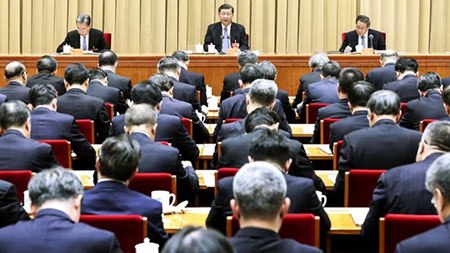by WorldTribune Staff, December 27, 2023
China’s Ministry of State Security took to the WeChat social network recently to warn against “cliches that denigrate the Chinese economy.”
“How strange that China’s economic policies for next year, ones that have just been adopted, were first explained by the Ministry of State Security,” a Chinese source in the economic field told Katsuji Nakazawa, a Tokyo-based senior staff and editorial writer at Nikkei
The post followed the Central Economic Work Conference, held Dec. 11-12, that was chaired by Chinese Communist Party (CCP) leader Xi Jinping. The annual conference set economic policies for the coming year, but it was the Ministry of State Security, an intelligence agency, that first reported in detail what was decided at the conference.

What was decided appears to be a major “crackdown on negative opinions regarding China’s economy,” Nakazawa noted.
The intel agency wrote on WeChat: “Various cliches that denigrate the Chinese economy have emerged. False theories about ‘China’s deterioration’ are being circulated to attack China’s unique socialist system.”
Among the takeaways, Nakazawa noted, is: “A structural shift in China’s economic policy planning is likely taking place. We can trace this back to the summer when the ministry created its official account on the popular WeChat platform.”
The account’s first post, on Aug. 1, came with the headline: “We need to mobilize the entire Chinese society to crack down on and prevent espionage.”
While cracking down on spies and conducting counterintelligence activities are the Ministry of State Security’s primary roles, Nakazawa noted that “defending China’s economy is not, though the recent and similar posts after another key economic policy meeting in late October indicate the ministry is expanding its purview.”
Under Xi Jinping’s rule, “even those who explain the situation of China’s waning economy using objective facts and figures could come under pressure. In the worst-case scenario, they risk being detained if they say too much,” Nakazawa wrote.
The spy agency’s posts on WeChat began “just as opinions were becoming prominent on China’s Internet that seemed to dismiss the government’s much-publicized official view that the economy was ‘recovering,’ ” Nakazawa added.
Economic analysts have detailed how foreign companies are leaving China, private companies are losing their motivation, and consumer confidence is declining.
“Their explanations come with statistics on investment inflows, the money supply and other indicators,” Nakazawa wrote. “Many such explanations do not directly refer to the Chinese government’s view that economic growth will certainly reach the official target of 5%. This is an important point as it indicates analysts are striving not to fall afoul of China’s tight controls on freedom of speech.”
The situation was foreshadowed 10 years ago during the third plenary session of the CCP’s Central Committee. The session was held in November 2013, exactly a year after Xi took the party’s helm, and was meant to set a basic direction for China’s economic policies under Xi.
“But what was announced straight after the third plenary session, through reports by state-run news media, was a decision about the establishment of the National Security Commission. At first glance, the decision seemed to have nothing to do with the Xi administration’s economic policy direction, which had been the center of attention, and it took many by surprise,” Nakazawa noted.
“But Xi’s focus on national security was something that would affect his economic policies in the decade ahead.”
Under Xi’s two predecessors, Jiang Zemin and Hu Jintao, China barreled ahead toward joining the World Trade Organization, which promised an economic bonanza. Once China was admitted to the body, its economy gained strong momentum.
“At the time, even Chinese researchers who had connections with national security organizations frequently traveled abroad to learn about the financial and economic systems as well as management methods of countries like the U.S. and Japan,” Nakazawa noted. “During their overseas trips, these researchers interacted and exchanged views with foreign bureaucrats and experts. But that kind of cordiality has all but disappeared.”
Under Xi’s rule, researchers and Chinese bureaucrats above a certain level are subjected to a strict screening process and monitored for fear they might leak information when meeting foreign economists.
“If these researchers, already feeling penned in, can no longer freely share the results of their studies or their economic outlooks, there’s no way they can write a truly effective prescription to boost China’s ailing economy,” Nakazawa wrote.
Publishers and Citizen Journalists: Start your Engines
